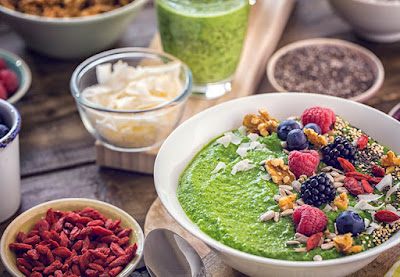Can You Reverse Type 2 Diabetes With A Raw Food Diet?
A raw food diet, as the name implies, is one that consists mostly of raw foods such as vegetables, fruits, and legumes. Several studies have found that following such a diet can help reverse type 2 diabetes, a metabolic condition that produces high blood sugar. But is this true? If so, how so?
The documentary 'Simply Raw: Reversing Diabetes in 30 Days' follows the lives of six diabetic Americans who adapt to a vegan, organic, raw diet. Some individuals were able to entirely discontinue diabetic drugs at the end of the month, while others noticed a significant reduction in the quantity of insulin and other prescriptions they were using.
 |
| Dr. Ashok Kumar Jhingan |
Dr. Ashok Kumar Jhingan, Senior Director - BLK-Max Centre for Diabetes, Thyroid, Obesity, and Endocrinology, BLK-Max Super Speciality Hospital, New Delhi, stated, "Healthy eating not only helps in regulating blood sugar levels but also maintains a healthy weight."
He went on to say that it's because of the "non-activated enzymes" found in raw meals. These enzymes may have health advantages for the body, although they are frequently lost in a moderate to high level following cooking or processing.
Another reason is that raw foods are chewier and higher in fiber, and they do not lose nutrients due to heat and processing.
As previously stated, a raw food diet is useful in diabetes management since it is "rich in potassium, fiber, magnesium, phytochemicals, and folate and low in sodium."
"All of these qualities of a raw diet assist to minimize the risk of diabetes and related consequences such as heart disease and cancer," Dr. Jhingan explained.
A raw food diet, on the other hand, offers various other advantages aside from stabilizing glucose levels. Other benefits of a raw food diet include weight loss, increased vitality, increased energy, improved treatment of chronic illnesses, and enhanced overall health.
Dr. Jhingan emphasized that diabetics do not need to completely change their diet to manage the illness. "Slowly including more fresh veggies and fruits into the diet, together with exercises and weight control, can assist enormously."
Downsides of raw food
Following a raw food diet, on the other hand, does not come cheap (be prepared for a higher grocery bill, for one thing). One research found a decline in bone mass and mineral density. A raw food diet might be deficient in iron, vitamin B12, vitamin D, calcium, and omega-3 fatty acids, depending on the foods consumed. Not all foods, however, are best consumed raw.
Cooking tomatoes with eggs allows the body to better absorb their nutrients. Some vegetables, such as potatoes, rhubarb, and cassava, are potentially poisonous when consumed uncooked. Finally, non vegan raw foodists who ingest raw milk, raw fish, and/or raw meat are at danger of foodborne disease.
If a raw food diet appeals to you, consult your health-care practitioner, particularly your nutritionist, first. Your team may work with you to ensure that this eating style is compatible with the rest of your diabetes treatment plan.
(Post Updated to improve readability and provide additional insights.)




Comments
Post a Comment
Share your views